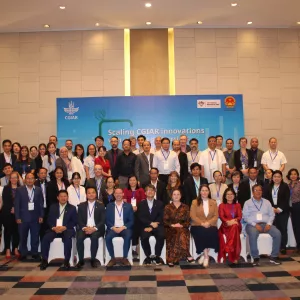Scaling CGIAR innovations with strategic partnerships
Hanoi, Vietnam, May 14-15, 2025 – The Ministry of Agriculture and Environment of Vietnam and CGIAR Scaling for Impact Science Program (S4I) jointly organized the regional workshop on “Scaling CGIAR innovations with strategic partnerships.” This event convened more than 70 experts and strategic partners from key focal countries in Southeast Asia, building upon the successes of the CGIAR Initiative on

Scaling CGIAR innovations with strategic partnerships
Hanoi, Vietnam, May 14-15, 2025 – The Ministry of Agriculture and Environment of Vietnam and CGIAR Scaling for Impact Science Program (S4I) jointly organized the regional workshop on “Scaling CGIAR innovations with strategic partnerships.” This event convened more than 70 experts and strategic partners from key focal countries in Southeast Asia, building upon the successes of the CGIAR Initiative on Asian Mega-Deltas (AMD) and paving the way for the next phase of CGIAR Science Programs (SPs), including S4I, focused on delivering tangible impact at scale.

As a transition event from AMD to S4I, the workshop highlighted the accomplishments of the AMD Initiative. Over three years of implementation, AMD successfully developed 85 innovations and organized over 200 capacity-sharing activities, reaching more than 8 million farmers and informing USD 1 billion of investments in climate resilience and low-emission rice initiatives across the delta countries of Bangladesh, Cambodia, India, Myanmar, and Vietnam. The lessons learned and best practices from running the Initiative were also shared.
Dr. Bjoern Ole Sander, lead of AMD, stated, “AMD achieved a significant number of outputs and outcomes through impactful partnerships and proven approaches.” He further added, “Looking ahead, we will strengthen these collaborations and scale successful innovations within new CGIAR programs like S4I, Sustainable Farming, and Climate Action, while deepening our focus on critical cross-cutting themes and robust policy frameworks to achieve lasting sustainability.”

Harnessing strategic partnerships, the workshop provided a platform for partners from Cambodia, the Philippines, and Vietnam, to reflect on innovations that may align with national priorities and food system development strategies. Dr. Rica Flor, scientist at the International Rice Research Institute and Area of Work co-lead of S4I, commented, “This workshop, motivated by building strategic partnerships, offers a vital opportunity for Cambodia, the Philippines, Vietnam, see how innovative solutions can directly address national priorities and food system strategies. For S4I, it is also a moment to open the discussion about the innovation systems in these countries, and find effective pathways to bring these innovations to scale.”
A key feature of the workshop was the country-specific group discussions, enabling stakeholders to conduct an innovation system analyses and pinpoint actors, barriers, and opportunities. These sessions highlighted the significant potential across all participating countries for scaling up innovation initiatives, particularly through the establishment of robust coordination mechanisms among research institutes, government bodies, businesses, and farming communities.
This workshop was envisioned as a springboard toward more regional and collaborative research for development and the scaling of agri-food systems innovations. Dr. Nguyen Do Anh Tuan, the director general of the International Cooperation Department of MAE, emphasized that “facing the complex challenges of climate change, no single country, organization, or individual can solve them alone. The journey to transform agricultural systems is a marathon, not a sprint. Success will come from perseverance, cooperation, and continuous innovation.”

New Zealand Ambassador Caroline Beresford also attended the workshop, reaffirming NZ’s commitment to continue supporting agricultural innovation initiatives in the region. The Ambassador expressed strong belief that S4I will continue to be a model for high-impact, inclusive, and science-based development in the region. In recognition of the 50 years of bilateral cooperation between New Zealand and Vietnam, CGIAR also acknowledged New Zealand’s significant contribution to AMD’s successful implementation, particularly within Vietnam.

